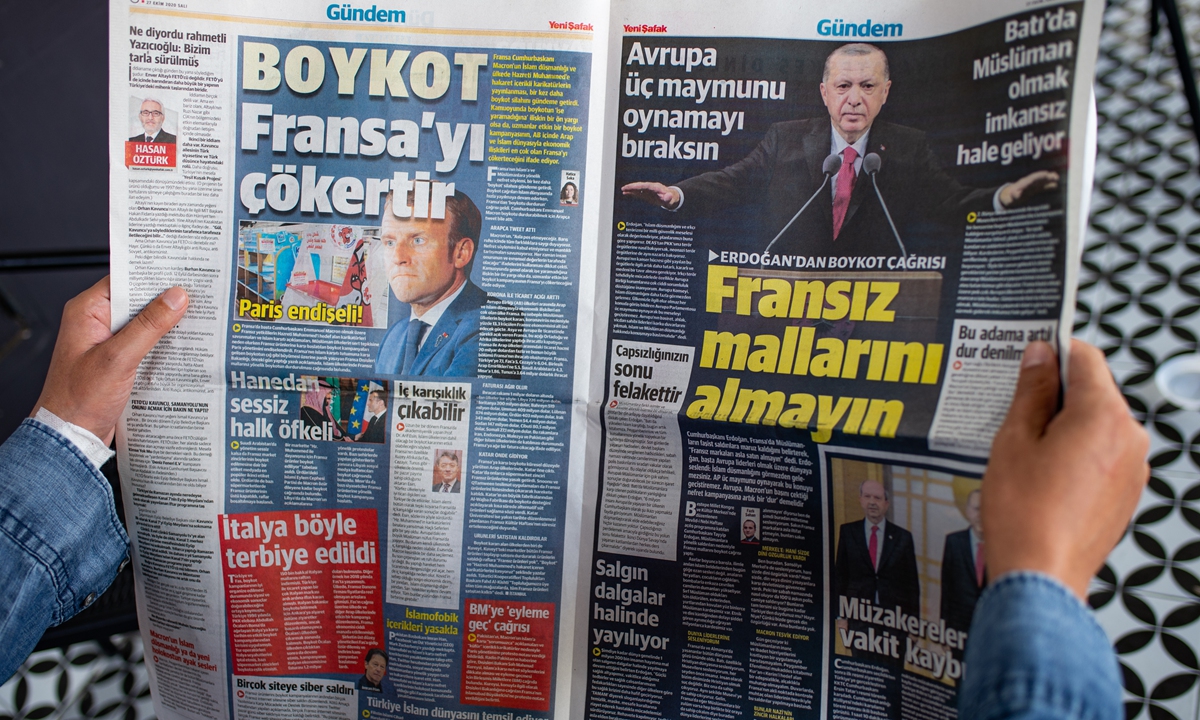France-Turkey frictions show secular strategies and struggles states face
By Zhang Yuan Source: Global Times Published: 2020/10/29 22:38:40

This picture taken on October 27, 2020 in Istanbul shows inside pages of the Pro-government newspaper Yeni Safak calling for a boycott of French goods. Turkish President on October 26, 2020 joined calls for a boycott of French goods, ramping up a standoff between France and Muslim countries over Islam and freedom of speech. Photo: AFP
Since the brutal beheading of French history teacher Samuel Paty on October 16, France has adopted a series of unprecedented stringent measures to quickly and effectively crack down on domestic terrorism. It has even attempted to contain extremism by forceful regulative measures toward specific religions.
Although international public opinion generally sympathized with the victimized teacher and condemned the terrorist's atrocities, antipathy was soon triggered in the Islamic world after French officials, particularly President Emmanuel Macron, intensively expressed in public that they would fight against "Islamic separatism."
Islamic countries, including Algeria, Egypt, Palestine, Qatar, Kuwait, Turkey, Saudi Arabia, Jordan, and Iran have seen social waves to boycott French goods. In his public speech, Turkish President Recep Tayyip Erdogan even criticized Macron for intensifying religious hatred. France fought back fiercely. Macron even recalled the French ambassador to Turkey. The two sides refuse to compromise. This is forming a diplomatic confrontation that is becoming more eye-catching than news about the COVID-19 pandemic.
Behind the deadlock between France and Turkey, there are profound historical contradictions and realistic political dilemmas each faces. To explain the current tensions between the two countries, it is necessary to look at their diplomatic frictions dialectically from the standpoint of France and the Islamic world.
First of all, from the French perspective, since the 2015 Charlie Hebdo shooting, French society has always maintained a vigilant attitude toward specific religions, especially Islam. France was still insisting on the argument that terrorism should not be muddled with a specific religion when the Charlie Hebdo incident occurred. But it started to target specific religions, as well as religious organizations and communities in 2020. This was actually the result of a burst of public opinion that was previously suppressed.
France is a secular country in which the principle of separation of church and state is established by law. However, France is also a traditional Catholic country, and Catholics enjoys many favorable benefits in daily life within the country. For example, French public schools are far more tolerant of wearing a cross than wearing a headscarf, or hijab, in schools.
Those who suggest that France adheres to the principle of secularism worry that if some religious behaviors, such as wearing a hijab, are allowed, the country will face political pressure from the trend of Islamization. The French-style separation of church and state is tantamount to recognizing secularism as a priority, and ranking religious freedoms next.
Since the Charlie Hebdo incident, the French society's attitude toward domestic Muslim communities has been, on the one hand, dissatisfied with Islamic-style life. It stresses that Muslims do not proactively integrate into the spirit of French republicanism. On the other hand, Muslim groups are often associated with issues that have perplexed French governing abilities, such as immigration and Middle Eastern refugees.
The tragedy of Paty has given French political leaders and civil society an opportunity to quickly form a consensus to strengthen controls on specific religious groups. As for the responses of EU countries recently, almost all European countries are on the side of France. From the perspective of Western developed countries, extremism, Islamism, and terrorist violence threaten the internal governance of their respective countries. They also sharpen fears that another religious civilization may shake the foundations of the Christian culture and democratic systems that the West is proud of.
Second, as far as the Islamic world is concerned, whether the Charlie Hebdo incident five years ago or the history teacher Paty's incident this time, it was the result of abusing freedom of speech and improper behavior that did not respect the Islamic rules. It is not the fault of religion itself.
As for Turkey, its Justice and Development Party has not rejected the political strategy of using Islam to attract people since Erdogan came to power. On diplomatic occasions, Turkey does not hide its will to be the leader of the Islamic world. Based on Turkey's perspective, France's harsh attitude toward domestic Islamism and extremism is rashly harming Islamic culture and stigmatizing Islam. Turkey believes that it is necessary to represent Islamic culture. This has led to the high-level direct diplomatic confrontation between Turkey and France.
Finally, as for an objective observer, especially for countries with a higher degree of secularization, the terrorist attack in France and the subsequent series of diplomatic frictions provide some clues to prevent the spread of extremism. They also remind countries to be prepared to face diplomatic, economic and trade pressure should they choose to strictly govern specific religions.
The author is professor of the Middle East Studies Institute at Shanghai International Studies University. opinion@globaltimes.com.cn
Posted in: VIEWPOINT